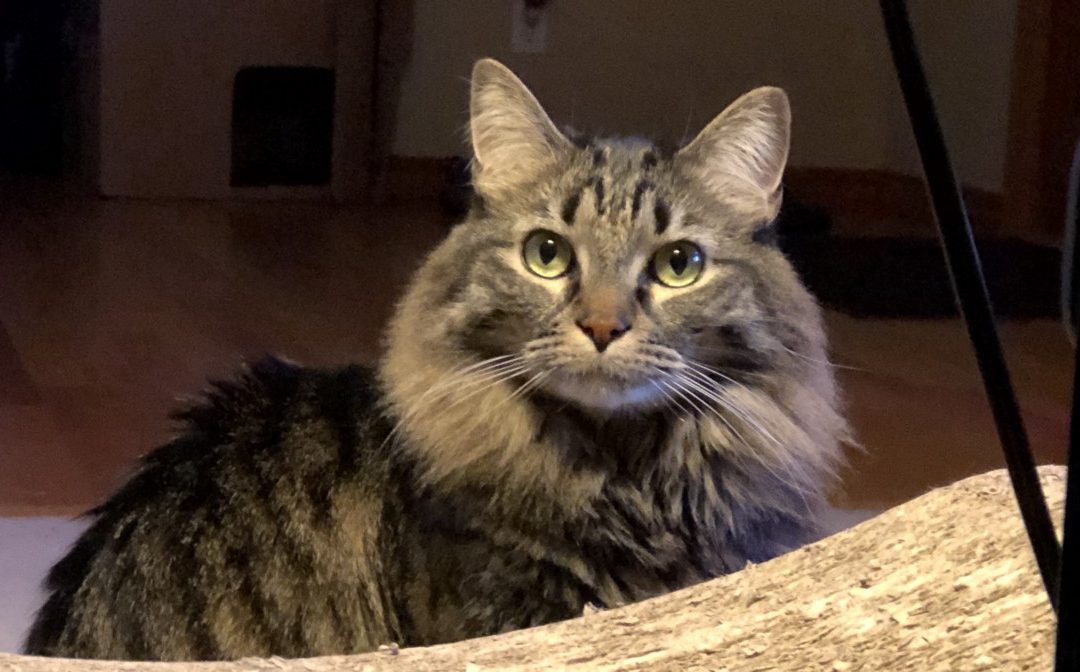Has your cat been more attentive since the Covid-19 crisis began? I started wondering about this when my daughter mentioned to me that one of the family cats had barely left her side since the quarantine shut down her school on April 13th. To be more precise, he prefers to be on top of her whenever she is positioned in a way that makes this possible. (Her other mom and I share custody, so I haven’t witnessed this firsthand.)
I got to thinking about Max, the cat who has decided I am his human. (That’s him in the picture above.) He is not a nighttime cuddler, leaving that distinction to our other cat. Although, once I started thinking about it, I realized that over the past week, Max has been visiting me more and more at night, sometimes multiple times.
Next, I considered our other cat, Jasper. He’s my wife’s cat, and yes, I think he has become even more glued to her than normal. His favorite spot is on a mat right on her desk. He will stay there observing and sleeping for hours at a time.
It’s not that I the routines of our household have changed much. My wife and I both been working from home for years, so the quarantine hasn’t had a significant impact on how often we are in the house. I believe what all these cats are picking up on is our anxiety and I think they are trying to help us alleviate it.
As I was giving Max yet another on-demand belly rub/brushing (I’m very well trained), I decided I would do some research on what science knows about the healing power of cats. There is a fair amount of debate over how much cats pick up on human emotions and how they respond, but there are some facts that seem well established.
According to UCLA Health — “The simple act of petting animals releases an automatic relaxation response.” Research on animal-assisted therapy shows that petting animals promotes mental health through the release of serotonin, prolactin and oxytocin- hormones associated with mood elevation. It also helps with physical health in ways such as lowering blood pressure, slowing the rate of breathing in those with anxiety, and reducing pain levels.
According to the Journal of National and Interventional Neurology, cat owners have a decreased risk for death due to MI and all cardiovascular diseases. They suggest that cat ownership may represent a novel strategy for reducing the risk of cardiovascular diseases in high-risk individuals. (Those scientist probably don’t understand that we don’t own cats, they own us. Still, their point is well taken.)
What is it about cats that make them so therapeutic for humans? I personally find a cat’s purr very relaxing, sometimes falling asleep to the sound. Gary Weitzman, a veterinarian and CEO of the San Diego Humane Society agrees, “I think the purr has a big benefit for humans…It calms us and pleases us, like watching waves against a beach. We respond to a cat’s purr as a calming stimulus and may have even genetically selected cats with more propensity to purr.”
Purring is not just calming, but may also be healing. The Journal of the Acoustical Society of America published a study showing that “purr frequencies correspond to vibrational/electrical frequencies used in treatment for bone growth/fractures, pain, edema, muscle growth/strain, joint flexibility, dyspnea, and wounds.” Such frequencies may not only be advantageous for the cats themselves, but for their humans.
All this seems to point to cats being little miracle workers — capable of assisting with both our physical and mental health.
Now seems like a wonderful time to take advantage of the comfort our furry ones offer us. The pandemic has our lives turned upside down, dealing with things we never imagined, leaving us overwhelmed by not being able to predict what comes next or how to prepare for it. Calming ourselves in healthy ways is an important part of self-care, now more than ever.
The next time Max demands my attention, I plan on stroking his belly just a little longer, taking some deep breathes, and feeling his purr soak into my core. I suspect it will make us both feel better. Maybe you’d like to do the same with your feline friend.
This article was originally published on Medium.com. Is Your Cat Trying to Calm You? Follow me on Medium: https://medium.com/@dakotaduncan

